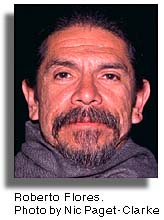|
On January 1, 1994 an organization of indigenous peasants from the state of Chiapas in southern Mexico came into the world's view when they took over five towns, including San Cristobal de Las Casas. Organized in a movement called the Ejercito Zapatista de Liberación Nacional (EZLN), now often called the Zapatistas, they called for changes in the Mexican economy and political structure which would guarantee increased democracy and self-determination for the Mexican people, in particular indigenous groups. Ten million of Mexico's 93 million people are indigenous. Ninety percent of the other 83 million are of mixed descent. The Zapatistas, many of them Tzetzales, Tzotziles, Tojolabales, Choles, and Mams focused criticism on the current globalization of economics experienced in many countries. In particular they targeted the policies of the World Bank, the International Monetary Fund and such treaties as NAFTA (the North American Free Trade Agreement) and GATT (the General Agreement on Trade and Tariffs). Calling these policies "Neoliberalism", the Zapatistas describe the effects of these policies as devastating to people around the world. Since the initial takeover of the five towns, the Zapatistas have developed their views based on a massive experiment in participatory democracy, gathering the views of over a million people. Now in ongoing negotiations with the Mexican government to change the Mexican constitution the Zapatistas work with the National Indigenous Congress (made up of delegates of 56 groups) and CONAI (the National Intermediation Commission) headed by Bishop Samuel Ruiz of San Cristobal. Articles in this section feature the views and discuss the experiences of the people of Chiapas and the global impact of their movement. (Published December 12, 2001) |
Articles by Roberto Flores (reverse chronological order)
|
| Return to Autonomy: California-Chiapas |
If you have any thoughts on this or would like to contribute to an ongoing discussion in the  What is New? || Affirmative Action || Art Changes || Autonomy: Chiapas - California || Community Images || Education Rights || E-mail, Opinions and Discussion || En español || Essays from Ireland || Global Eyes || Healthcare || Human Rights/Civil Rights || Piri Thomas || Photo of the Week || QA: Interviews || Region || Rural America || Search || Donate || To be notified of new articles || Survey || In Motion Magazine's Store || In Motion Magazine Staff || In Unity Book of Photos || Links Around The World NPC Productions Copyright © 1995-2020 NPC Productions as a compilation. All Rights Reserved. |



 This section is co-edited by Roberto Flores who currently lives in Los Angeles, California. Roberto (Beto) Flores (he previously used the pen name "Beto Del Sereno") returned in the fall of '97 from Chiapas where he did research on the "Feminine Factor Within the Zapatista Movement." Beto, a life-long activist for human rights, is now working with others on facilitating and developing the concept of "autonomy" as a method of rebuilding through structural development of oppressed communities.
This section is co-edited by Roberto Flores who currently lives in Los Angeles, California. Roberto (Beto) Flores (he previously used the pen name "Beto Del Sereno") returned in the fall of '97 from Chiapas where he did research on the "Feminine Factor Within the Zapatista Movement." Beto, a life-long activist for human rights, is now working with others on facilitating and developing the concept of "autonomy" as a method of rebuilding through structural development of oppressed communities.